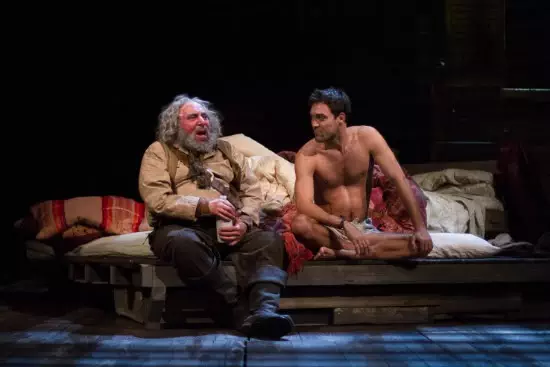
Mike Farren is disappointed with the RSC’s dull and dutiful production of Shakespeare’s history plays …
“Well, we got through it,” said a voice behind me. I was in the beautiful Alhambra, I had just seen a play by the world’s greatest dramatist, performed by one of the world’s greatest drama companies, starring one of the world’s greatest actors, and I was surrounded by empty seats and the feeling that something had been “got through”. On reflection, I agreed.
It was the Friday performance of Shakespeare’s Henry IV, Part 1 and it was difficult to isolate what was wrong. The performances were good, the staging clear and competent and if the play is not Shakespeare’s greatest, I have seen compelling productions in the past.
Ultimately, there was too much deference toward Anthony Sher, starring as Falstaff. This had the effect of putting too much emphasis on the comic element of the play. Sher’s performance was intelligent and mannered, but far from the force of nature that Falstaff must be, to seize control of the play. If we believe Shakespearean comedy is the ancestor of modern British humour, then Sher was more Leslie Phillips gone-to-seed than a bawdy, saturnine Sid James. His upper-class drawl suggested a knowingness: this Falstaff was in on the joke, when he really should be the joke. Although padded to perfection, Sher’s performance wasn’t big enough to bear the weight placed on it.
If the comic scenes were foregrounded, comedy also spilled out into the rest of the play, defusing the sense of a regime on a knife-edge. This was partly the fault of the play, as it’s difficult to know how else to portray Glendower and Hotspur. However, in the latter case, it was surely unnecessary to portray the rebel leader as quite such a strutting bantam-cock, as if some boy band had leant the play its singer. Although Trevor White mugged and postured with gusto, it prevented us from taking the threat to the kingdom seriously.
One glaring omission from the staging, in this year of the Scottish referendum and much national navel gazing, was to overlook the regional aspects of the play and the questions it asks about Britain. Certainly, Glendower (Austin Richards) and Douglas (Sean Chapman) had their nationalities marked out by their accents, and one of the few successes was the touching Welsh folksong sung by Glendower’s daughter and Mortimer’s wife (Nia Gwynne). However, Hotspur lacked any hint of Geordie to set up an opposition to the metropolitan ‘accentless’ voices of the King and Court. Likewise, the set made nothing of the national question, breaking its multi-functional neutrality only with the heavy religious symbolism of a large crucifix – a symbol that lacked significant reference within the plays.
Like Hotspur, Hal (Alex Hassell), also looked to have stepped out of a boy band, parading a ripped torso and his bromance with Poins (Sam Marks). However, the lack of any serious provocation from Falstaff or rivalry from Hotspur meant that his dramatic role gained little traction. The hints that Shakespeare gave him of throwing off his debauchery and taking up his regal responsibilities sounded simply glib in this production.
Out of duty, rather than anticipation, I returned on Saturday. This time, a full house promised better, and this time the performance began with greater pace and urgency, with the uncertain result of the Battle of Shrewsbury being well-conveyed. However, the tension again dissipated once the comic characters took the stage with aimless, ill-choreographed slapstick. At the interval, I left – something I had never done before.
It felt like a liberation to be released from a sense of obligation weighing heavily on me, on the audience and perhaps on the company. I felt that the RSC had to be here for some outreach remit, while the audience had to use-it-or-lose-it. It doesn’t have to be like that. I love to see Shakespeare professionally performed in Bradford as much as the next citizen and previous tours have been consistently better than this. Perhaps the answer is to treat each tour on its merits, rather than deferring automatically to the royal sacred cow.